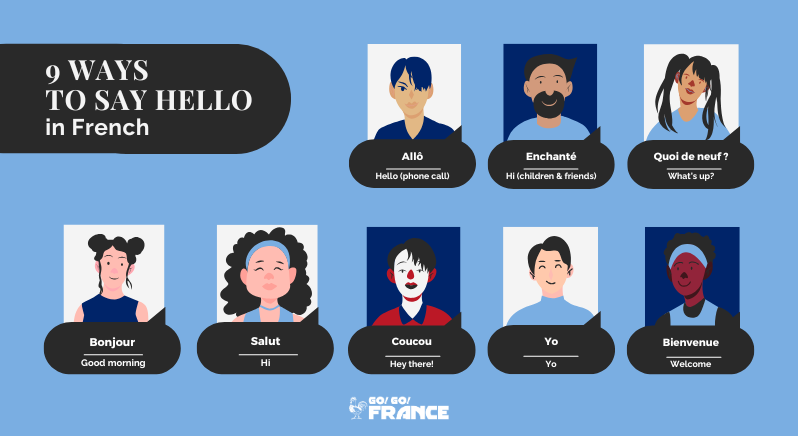When learning French, we often focus on grammar, vocabulary, and pronunciation. However, one fun and overlooked aspect is the use of French onomatopoeia. From a cat purring to raindrops falling, onomatopoeia adds color and personality to your language skills.
Let’s explore how these playful words can boost your fluency and deepen your understanding of everyday French conversation.
Different Types of Onomatopoeia
French onomatopoeia, like onomatopoeia in other languages, can be divided into categories based on the types of sounds they imitate. Animal sounds capture how animals communicate, while nature sounds mimic environmental noises like rain or wind. Human sounds reflect actions or bodily noises, and mechanical or object sounds imitate noises made by machines or everyday items.
Common French Onomatopoeia You Should Know
Here are some basic onomatopoeia that will help you sound more like a native speaker:
| Onomatopoeia | Meaning | Example Sentence |
| Ouaf ouaf | Dog barking | Le chien fait ouaf ouaf dans le jardin. The dog barks woof woof in the garden. |
| Miaou | Cat meowing | Le chat dit miaou quand il a faim. The cat says meow when it’s hungry. |
| Cocorico | Rooster crowing | Le coq chante cocorico le matin. The rooster crows cock-a-doodle-doo in the morning. |
| Meuh | Cow mooing | La vache fait meuh dans le pré. The cow goes moo in the meadow. |
| Cui cui | Bird chirping | Les oiseaux chantent cui cui à l’aube. The birds chirp tweet tweet at dawn. |
| Ploc ploc | Raindrops falling | La pluie fait ploc ploc sur la fenêtre. The rain goes plop plop on the window. |
| Crac | Twig snapping | La branche a fait crac sous mon pied. The branch snapped with a crack under my foot. |
| Zzzz | Buzzing (bees/flies) | Les abeilles font zzzz près des fleurs. The bees buzz zzzz near the flowers. |
| Ronron | Purring (like a cat) | Le chat ronronne doucement sur mes genoux. The cat purrs softly on my lap. |
| Gling gling | Ringing (bell) | La cloche a fait gling gling à la porte. The bell went ring ring at the door. |
| Boum | Loud crash or bang | Il y a eu un grand boum dans la rue. There was a big boom in the street. |
| Pff | Exhale in frustration | Il a fait pff en entendant la mauvaise nouvelle. He went pff when he heard the bad news. |
| Tchou tchou | Train whistle | Le train est parti en faisant tchou tchou. The train left with a choo choo sound. |
| Vroum | Car engine revving | La moto a démarré avec un vroum puissant. The motorcycle started with a loud vroom. |
| Ding | Bell or doorbell ringing | La sonnette fait ding à chaque visiteur. The doorbell goes ding for every visitor. |
| Tic tac | Clock ticking | L’horloge fait tic tac toute la nuit. The clock ticks tic-tac all night. |
| Pschitt | Spray or fizzing sound | J’ai ouvert la bouteille, et elle a fait pschitt. I opened the bottle, and it went fizz. |

How Often Do French People Use Onomatopoeia
French people use onomatopoeia quite frequently, especially in informal settings and everyday conversations. These playful sound words are common in storytelling, casual chats, and when describing actions or noises in a lively way. Onomatopoeia like “boum” and “pfff” (for exasperation or frustration) are particularly common, and you’ll often hear French people use them in daily life.
While less common in formal contexts, they are still a key part of French communication, helping to make expressions more vivid and engaging.
Why Learning French Onomatopoeia
Learning French onomatopoeia can greatly enhance your language skills by improving listening comprehension and making conversations more engaging. These playful sounds appear frequently in informal speech, helping you understand native speakers better. Onomatopoeia also aids memory retention because they’re often easy to recall. Plus, using these sounds in conversation adds personality and fluency, making your French more expressive and natural. Incorporating onomatopoeia is a fun, effective way to enrich your language learning experience.
Where to Learn French Onomatopoeia
If you’re living and studying in France, you’ll naturally encounter French onomatopoeia in everyday conversations, through casual interactions with locals, or while watching French content on YouTube for example. Be patient and you’ll pick them up as your conversational skills improve.
If you are interested in learning French in France, we are here to assist you in selecting the ideal language school based on your unique needs. Whether you’re looking for standard or intensive programs, or learning French for casual, business, or academic purposes, our partners offer a wide range of courses to help you achieve your goals. Contact us for more information!










